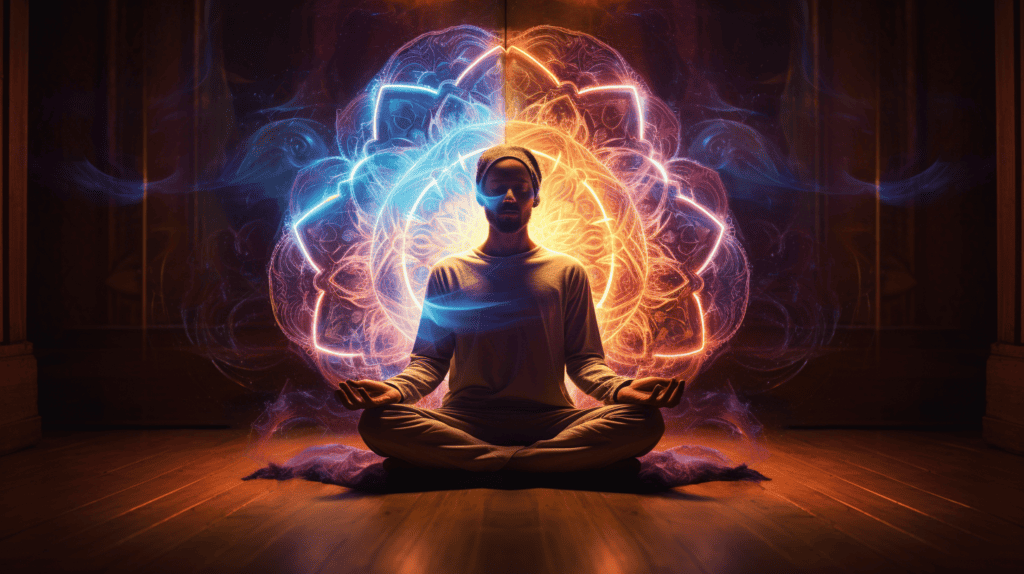As someone who has spent years delving into the depths of spiritual meditation practices for sleep, I’ve come to understand just how pivotal a good night’s sleep is for our mental and physical well-being. However, many people struggle to fall asleep, stay asleep, or get quality sleep. Meditation can be an effective remedy for resolving sleep issues.
Meditative practices help reduce stress and anxiety, promote relaxation, and get both the mind and body ready for sleep.
Meditation and spiritual practices can enhance sleep quality when done correctly. This article will explore some of the top meditation techniques before bedtime. Combining meditation with other healthy sleep hygiene habits can help you finally get the deep, restorative sleep your body needs.
Key Takeaways
- Make sleep a top priority for wellbeing. Sleep problems severely impact health over time.
- Meditation is an evidence-based way to improve both sleep duration and depth. It’s ideal to practice in the hour before bedtime.
- Experiment with techniques like mantras, visualizations, mindfulness, and chakra clearing to find what works best.
- Relaxing practices are preferable over intense concentration before bed. The goal is to calm the mind and body.
- Combine meditation with proper sleep hygiene, like managing stress, restricting food intake at night, and establishing a bedtime routine.
- Be patient and stick with a sleep meditation practice for several weeks to notice the full benefits. Over time, it can make falling asleep much more accessible.
- Don’t underestimate the power of just a few minutes of meditation to enhance sleep. Prioritizing meditation can vastly improve mental and physical health.
Types of Meditation for Sleep
Many contemplative practices promote restfulness at night. Experiment to see which techniques work best for you. I recommend trying each technique a few times to see if it will improve your sleep.
“Meditation may help you sleep better as a relaxation technique; it can quiet the mind and body while enhancing inner peace.” – Healthline
Guided meditations and visualizations
Soothing-guided meditations can lull both mind and body into a tranquil state. These recordings talk you through calming visualizations, often incorporating:
- Deep breathing
- Body scanning
- Mental imagery
- Affirmations
- Music
Guided sleep meditations may have you envision relaxing nature scenes or interact with spirit guides and higher beings. This engages your imagination to block out worries and stressful thoughts.
Other visualizations include:
- Floating among stars
- Sinking into a warm bath
- Walking along a serene beach or forest path
Mantras and breathing exercises
Repeating mantras tunes out distracting thoughts. Mantras can be short words, phrases, or sounds. Traditional favorites include:
- Om
- Hum
- Peace
- Relax
Slow, rhythmic breathing also quiets the mind. Equally, inhaling and exhaling promote inner stillness. Try alternating counts – breathe in for five counts, out.
Combine mantras and deep breathing for amplified effects.
“People may use a variety of meditation styles to help them sleep, including mindfulness meditation, guided meditation, qigong, tai chi, and yoga.” – Sleep Foundation
Chakra clearing and energy balancing

In Eastern medicine, chakras are energy centers running along the body. Blockages or imbalances in these chakras can manifest in physical or mental unrest.
Tip: I always reference the chart below to focus on each chakra color while I meditate
Meditations that open, clear, and harmonize chakras can encourage deep relaxation. Imagine each swirling chakra radiating with its associated color. Or repeat affirmations related to each chakra.
Chakra Locations and Attributes
| Chakra | Location | Color | Key Words |
|---|---|---|---|
| Root | Base of spine | Red | Safety, security |
| Sacral | Lower abdomen | Orange | Creativity, emotions |
| Solar plexus | Upper abdomen | Yellow | Confidence, self-esteem |
| Heart | Center chest | Green | Compassion, forgiveness |
| Throat | Throat | Blue | Communication, expression |
| Third eye | Forehead | Indigo | Intuition, wisdom |
| Crown | Top of head | Violet | Spirituality, connection |
Clearing energetic imbalances – where too much or too little energy flows through a chakra – can stabilize the whole system.
Mindfulness and insight meditation
Mindfulness meditation builds present-moment awareness. This detachment from regrets about the past and worries about the future anchors you in the here and now.
As thoughts arise, gently note them and return focus to the breath. This teaches equanimity and reduces rumination. Starting meditators often begin with mindfulness to calm racing minds.
Insight meditation takes this a step further. It encourages letting go of attachments and seeing through illusions about the self and world. This relinquishment of control brings acceptance and peace.
Yoga nidra meditation
Yoga Nidra meditation is a systematic technique that guides you into a deep state between waking and sleeping. It moves through different levels of consciousness and brainwave states. This meditation helps reduce anxiety, relieve stress, and improve sleep quality. The practice involves setting an intention and then listening to guided instructions while lying down in a comfortable position. Yoga Nidra brings awareness through the body by mentally scanning and sensing different parts. The meditation ends with revisiting the intention that was set at the beginning.
Loving-kindness meditation
Loving-kindness meditation focuses on cultivating compassion and love towards oneself and others. This practice typically starts with developing kindness towards yourself first. Then, it expands the kindness towards loved ones, the community, and all beings. You can repeat phrases like “May I be happy” or “May you be at peace” during the meditation. Loving kindness promotes feelings of warmth, safety, and connectedness. It reduces isolation, anger, and anxiety before sleep.
Sound bath meditation
Sound bath meditation uses instruments like singing bowls, chimes, and gongs to guide relaxation. The soothing vibrations and tones invoke a deep calm and bliss. This is often practiced lying down while focusing on the sounds. Sound bath allows the mind to drift gently without effort or concentration. The resonance brings the nervous system into harmony. It prepares the body for rest by slowing breathing and heart rate.
The importance of quality sleep

Sleep allows the body to restore and rejuvenate itself. During sleep, the body heals itself and consolidates memories. Getting adequate sleep is vital for:
- Boosting immune system functioning
- Maintaining a healthy weight
- Reducing inflammation
- Enhancing learning and memory
- Improving mood
- Increasing creativity and problem-solving abilities
- Reducing the risk of severe medical conditions like heart disease, diabetes, and stroke
Without proper sleep, cognitive function and physical health rapidly decline. Ongoing sleep deprivation raises the risk of neurological diseases like Alzheimer’s and dementia. Quality sleep should be a top health priority.
“Learn to ease into sleep with mindful awareness and clear-sighted planning with no heavy hand.” – Mindful.org
How meditation can improve sleep
Meditation is an evidence-based way to enhance sleep quality and duration. Regular meditation:
- Lowers stress hormones like cortisol
- Decreases activity in the amygdala, the brain’s fear center
- Activates the parasympathetic nervous system responsible for relaxation and regeneration
- Increases melatonin and natural neurotransmitters associated with sleep
- Slows racing thoughts and mind wandering
Meditation empties the mind, unwinds the body, and allows you to enter the deepest stages of sleep more quickly. It also improves your ability to fall asleep if you wake up at night.
Benefits of Meditation for Sleep
Why is meditation an ally for improvement in sleep? Studies demonstrate meditation:
Reduces stress and anxiety
Meditation decreases activity in the brain’s default mode network. This area is linked to mind wandering, distressing thoughts, and anxiety. Quieting this chatter induces calm.
Cortisol and other hormones that create stress and alertness are lowered. This facilitates sleep.
Lowers blood pressure
As meditation eases tension, blood pressure drops. This enhances peripheral blood flow, which allows the body to rest and recharge optimally.
Activates the parasympathetic nervous system
The parasympathetic nervous system governs resting state functions like digestion and circulation. Meditation triggers this system, so the body shifts into renewing itself. This counters the fight-or-flight sympathetic nervous system.
Improves sleep quality and duration
Those who meditate fall asleep faster and spend more time in deep, slow wave and rapid eye movement (REM) sleep. This means meditation boosts time spent in rejuvenating sleep stages.
Reduces risk of Alzheimer’s and other diseases
By bolstering sleep quality and duration, meditation helps prevent cognitive decline and disorders. Poor sleep is linked to higher dementia risk.
How to Practice Sleep Meditation
To use meditation as part of your sleep routine:
Timing – right before bed
Practice meditation in the hour before bedtime to maximize effects. This prevents mental stimulation too close to sleep. But don’t meditate when overly tired – it takes a degree of alertness.
Focus on relaxation rather than awareness
Prioritize relaxing meditations over those emphasizing insight. Mindfulness and contemplative traditions have overarching aims beyond just preparing for bed.
Choose techniques that instill tranquility, not intense concentration. Stay away from prolonged sitting meditation.
Techniques
Try these methods to ease into slumber:
1. Body scans
Slowly scan attention from head to toe, consciously releasing tension in each body part. Feel them sinking and softening.
2. Visualizations
Picture calming scenes like stargazing, beach walks, or forest bathing. Imagine yourself there using all your senses.
3. Mantras
Repeat your favorite short phrase or word with breathwork. Let this occupy the mind.
4. Mindfulness
Note thoughts nonjudgmentally as they pass through awareness. Continually return focus to the present.
Additional Sleep Recommendations
While meditation is precious, also:
Stop eating before bed
Don’t eat within 2-3 hours of bed to improve sleep quality. Digestion interferes with sleep. Light snacks are ok but avoid heavy foods.
Manage stress
Reduce obligations and worries as much as possible. Set boundaries and make time for unwinding. Massage, baths, and music lower stress too.
Establish bedtime routine
Follow the same sequence each night, like brushing your teeth, reading, and meditating to tell your body it’s time for sleep. Rituals signal rest.
Conclusion on spiritual meditation practices for sleep
Summary of main points
- Quality sleep is vital for wellbeing but often elusive
- Meditation calms the mind and body, so you sleep faster and more deeply
- Types like mantras, breathwork, and visualization aid relaxation
- Meditation balances stress hormones, brain activity, and nervous system functioning to enable sleep
- Practice meditation, proper sleep hygiene, and stress management together
Encouragement to try meditation for better sleep
Don’t underestimate what a few moments of meditation can do for sleep troubles. The time invested pays exponential dividends for mental and physical health. Explore different methods to find what resonates most. Be patient and stick with the practice for several weeks to notice improvements. Sweet dreams!
FAQ on spiritual meditation practices for sleep
Q: What is meditation?
A: Meditation is a practice that involves focusing the mind and eliminating the stream of jumbled thoughts that may be crowding your mind and causing stress.
Q: How can meditation help with sleep?
A: Meditation can help with sleep by calming the mind, reducing stress and anxiety, and promoting relaxation, which are all conducive to better sleep.
Q: What is mindfulness meditation?
A: Mindfulness meditation is a type of meditation that involves bringing your focus to the present moment and observing your thoughts and sensations without judgment.
Q: How can body scan meditation help improve sleep?
A: Body scan meditation involves focusing on each part of your body, paying attention to any physical sensations, and releasing tension. This can promote relaxation and help improve sleep.
Q: What are some different meditation techniques to help sleep better?
A: Some meditation techniques to help sleep better include mindfulness meditation, body scan meditation, and guided imagery, all of which can promote relaxation and improve sleep quality.
Q: How long should I meditate for better sleep?
A: The ideal length of time for meditation to improve sleep can vary, but even just a few minutes of meditation before bed can have a positive impact on promoting better sleep.
Q: How does meditation improve sleep?
A: Meditation improves sleep by activating the relaxation response, reducing stress and anxiety, and quieting the mind, all of which can contribute to a more restful and restorative sleep experience.
Q: Can meditation and mindfulness practices help with sleep disorders like insomnia?
A: Research suggests that meditation and mindfulness practices can help with sleep disorders like insomnia by promoting relaxation and reducing the negative thoughts and worries that often contribute to sleep disturbances.
Q: How can meditation be incorporated into a bedtime routine for a good night’s sleep?
A: Meditation can be incorporated into a bedtime routine for a good night’s sleep by setting aside time, finding a comfortable and quiet space, and using meditation to unwind and relax before sleep.
Q: Are there specific meditation styles particularly effective for promoting better sleep?
A: Yes, meditation styles such as body scan meditation, mindfulness meditation, and simple meditation techniques can be particularly effective in promoting better sleep by helping to calm the mind and relax the body.





Leave a Reply